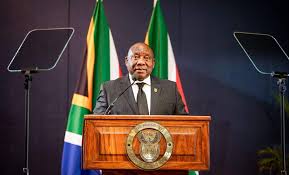President Cyril Ramaphosa has reaffirmed South Africa’s commitment to stronger ties with the Group of Seven (G7), describing the bloc as a strategic ally in key national priorities such as climate resilience, a just energy transition, and value-added mineral beneficiation.
Speaking after returning from the G7 Summit Outreach Session in Kananaskis, Alberta, Canada, the President said South Africa sees the G7 as a critical partner in navigating global economic and environmental challenges.
“We seek greater cooperation in areas such as investment, financing for development, international crime, climate change and just transitions, as well as inclusive global growth,” President Ramaphosa said during a briefing on Tuesday.
The G7 – made up of Canada, France, Germany, Italy, Japan, the United Kingdom, and the United States, with the European Union participating – hosted the summit to deliberate on pressing global matters. South Africa attended as part of the Outreach Session, which invited select countries to discuss energy security, technological innovation, and critical mineral supply chains.
This year’s theme closely aligned with South Africa’s priorities, especially as the country currently holds the G20 presidency. Ramaphosa said the summit was “most meaningful” for advancing South Africa’s international agenda and building diplomatic relationships.
In bilateral meetings, he engaged leaders from Canada, France, Germany, and South Korea, discussing economic cooperation and strategic partnerships, particularly around Africa’s critical minerals and climate adaptation financing.
The President placed climate change firmly on the summit’s agenda, citing the devastating impacts of floods in KwaZulu-Natal and Eastern Cape, and ongoing droughts in the Western Cape as urgent signs of the climate crisis in Southern Africa.
“We put forward that there should be sufficient international funding for climate-related incidents, which now occur frequently, particularly in our region—SADC—and our provinces like KwaZulu-Natal and Eastern Cape,” said Ramaphosa.
He used the platform to call for fair access to climate finance, urging wealthy nations to fulfill their pledges to assist developing countries in dealing with environmental disasters and energy transitions.
On the economic front, Ramaphosa stressed that South Africa would not continue to be a raw materials exporter, calling instead for a new model that emphasizes mineral beneficiation and domestic value chains.
“Our minerals should no longer be extracted and exported raw. We want value-addition – beneficiation must become the new standard. Investors must know up front that value chains are part of the deal,” he said.
South Africa is rich in critical minerals like platinum, lithium, and manganese, which are crucial for clean energy technologies, including electric vehicles and batteries. Ramaphosa said the country’s development goals now demand that mineral wealth be harnessed not just for foreign exchange but for local job creation, industrialisation, and economic transformation.
He noted that South Africa’s Just Energy Transition Investment Plan (JET-IP) and its push for green industrialisation make the country a key partner for investors seeking stable, sustainable opportunities in Africa.
In his talks with Canadian Prime Minister Justin Trudeau, Ramaphosa welcomed Canada’s new Africa Strategy, noting alignment with the African Union Agenda 2063 and South Africa’s economic diplomacy.
“There is room to deepen cooperation in education, trade, clean energy, and peacebuilding. Canada has a comprehensive view of Africa, and we want to collaborate wherever our goals align,” Ramaphosa added.
The Outreach Session was also an opportunity for G7 and invited countries to align strategies on energy diversification, critical infrastructure, and inclusive development. The discussions also touched on tackling transnational crime, illicit financial flows, and geopolitical tensions that impact emerging economies.
As South Africa moves forward with its G20 presidency, Ramaphosa indicated that lessons from the G7 will inform global discussions on inclusive growth, digital transformation, climate justice, and Africa’s development priorities.
The President reiterated that South Africa’s foreign policy remains anchored on multilateralism, equitable trade, and global cooperation, particularly with countries that share a common vision for sustainable development.
